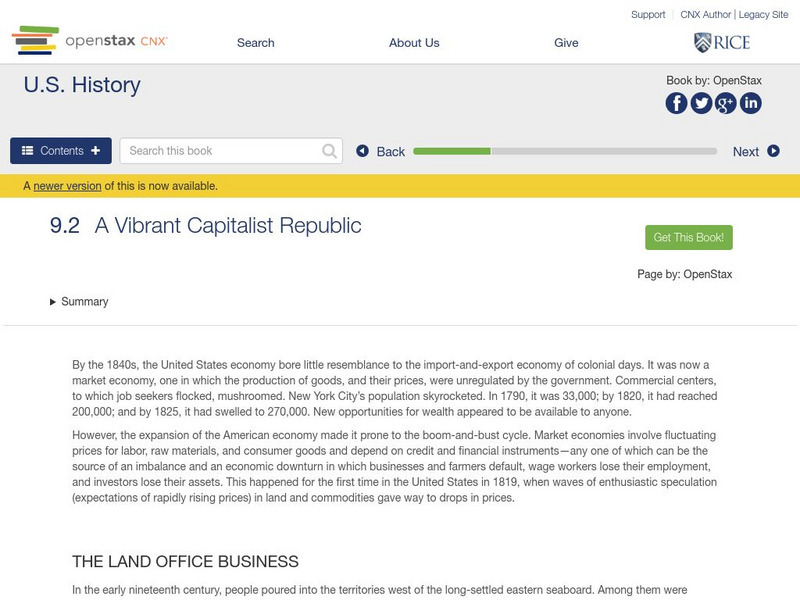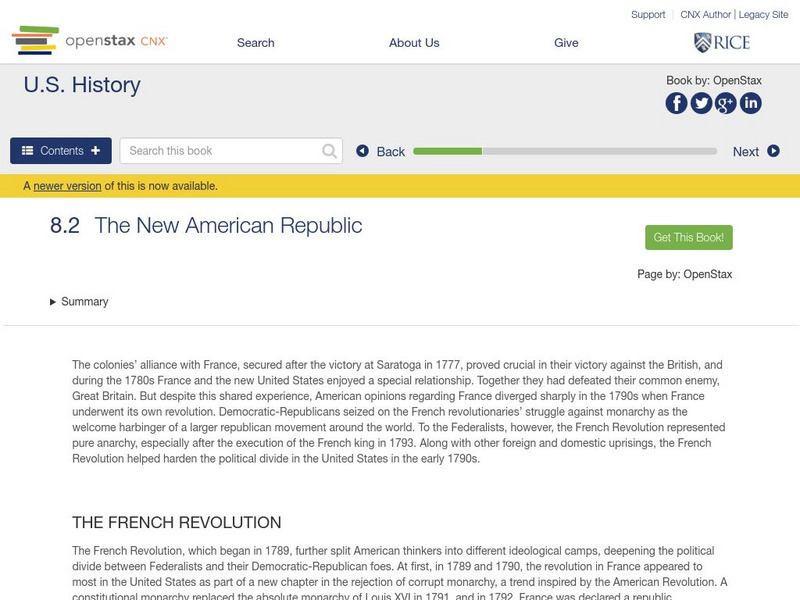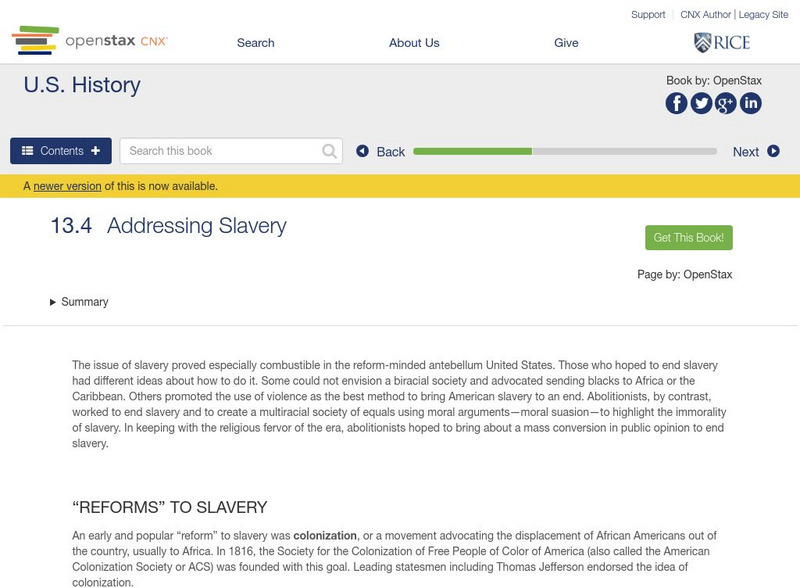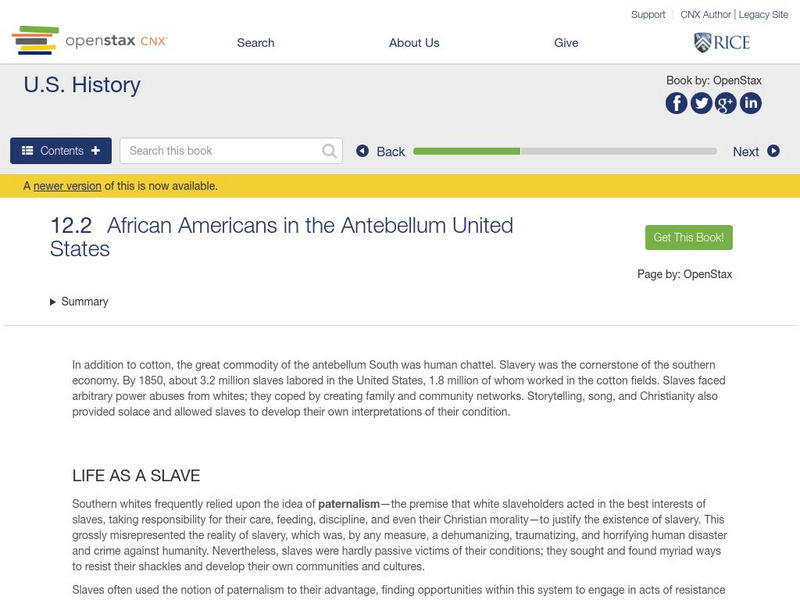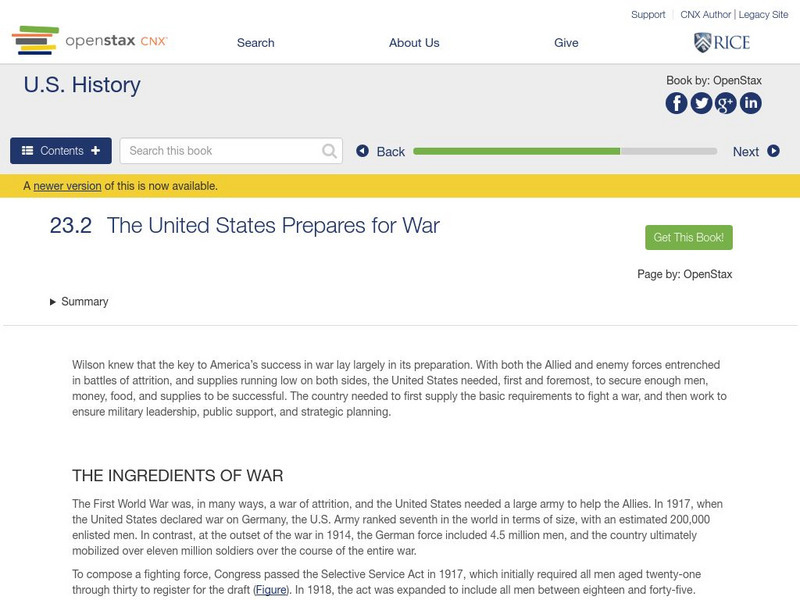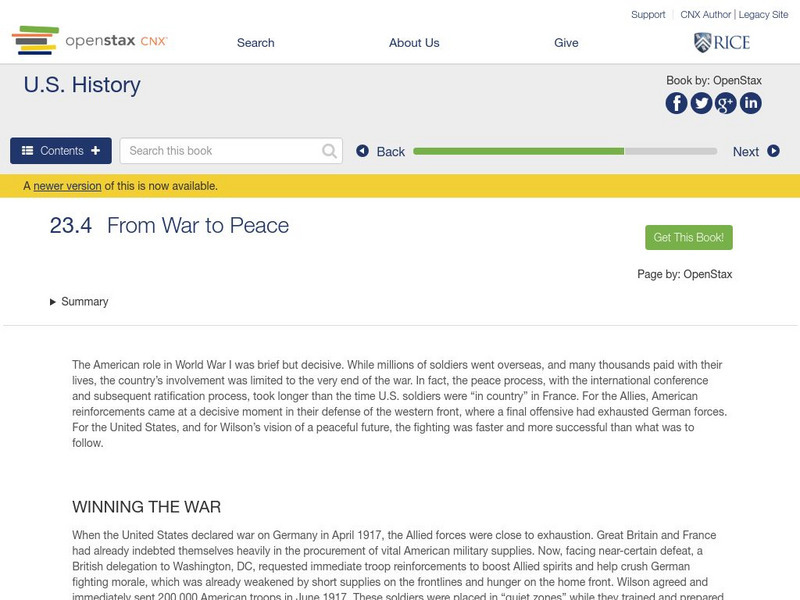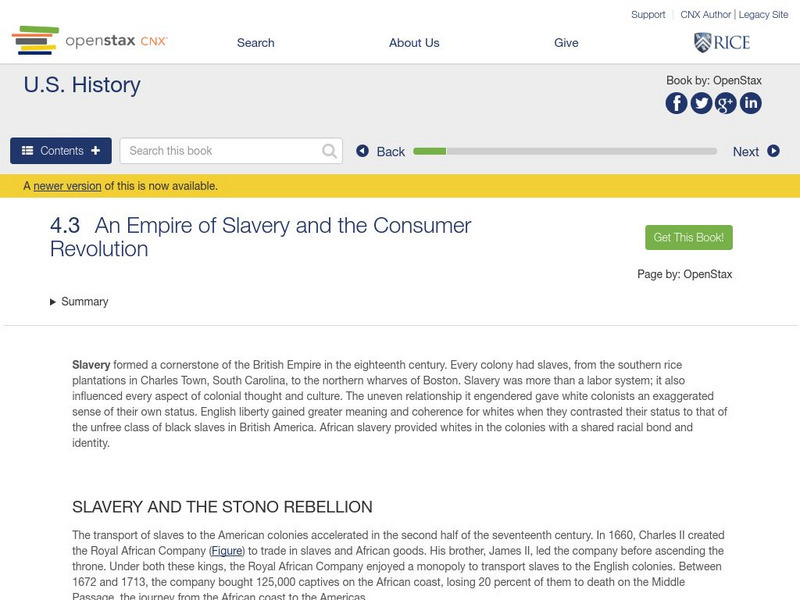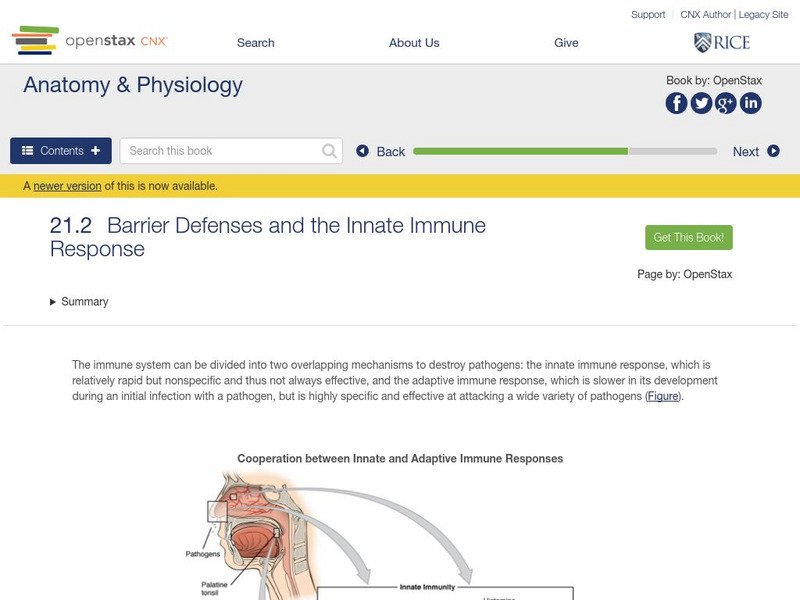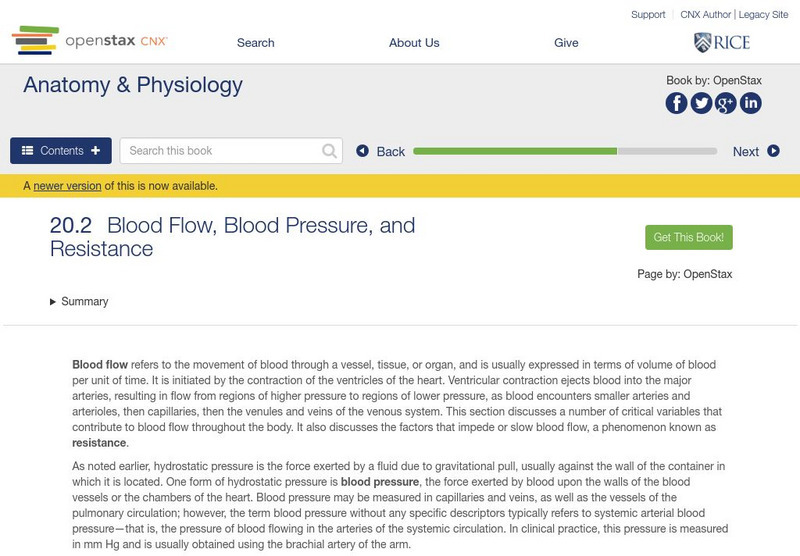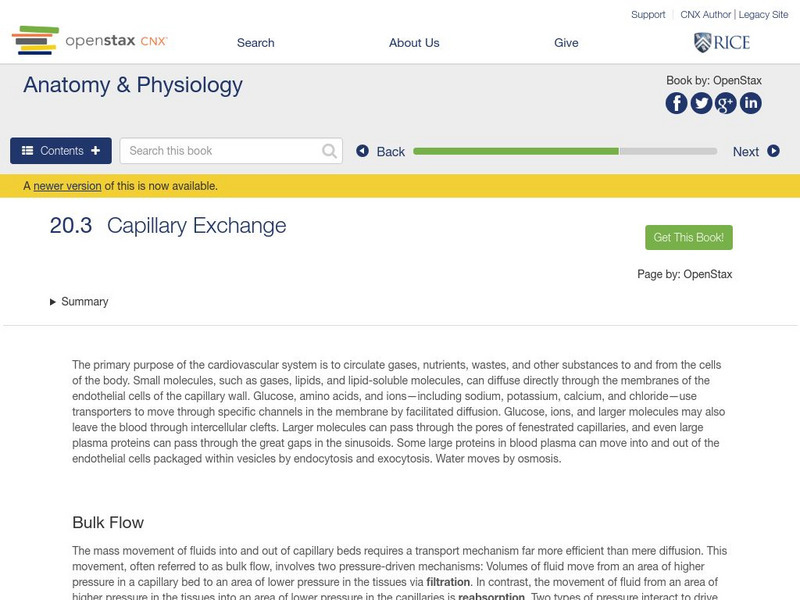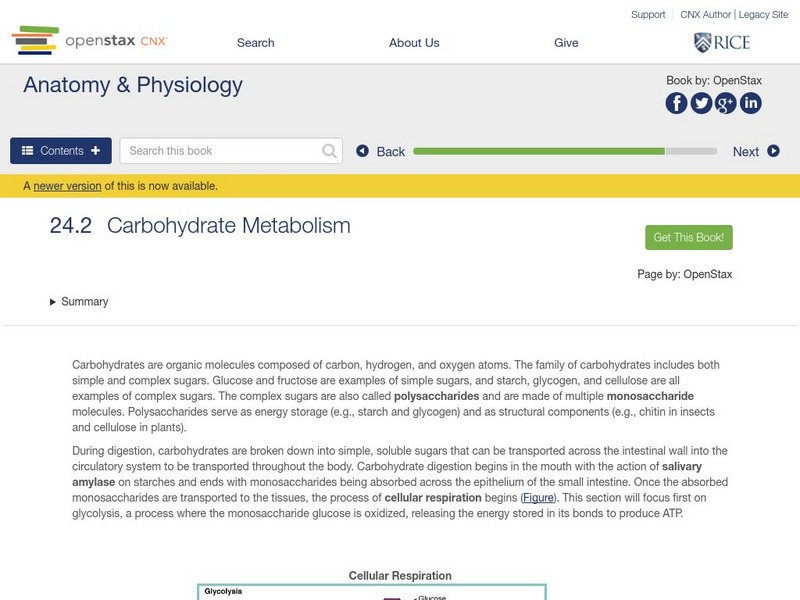OpenStax
Open Stax: A Vibrant Capitalist Republic
By reading this section of a chapter on "Industrial Transformation in the North," students will be able to explain the process of selling western land, discuss the causes of the Panic of 1819, and identify key American innovators and...
OpenStax
Open Stax: Physics: Acceleration
In this interactive module, students will define and distinguish between instantaneous acceleration, average acceleration, and deceleration. They will also calculate acceleration given initial time, initial velocity, final time, and...
OpenStax
Open Stax: Anatomy & Physiology: Accessory Structures of the Skin
Learn here about the accessory structures of the skin, including, hair, nails, sweat glands, and sebaceous glands.
OpenStax
Open Stax: Physics: Problem Solving Strategies
In the following interactive students will begin to understand and apply a problem-solving procedure to solve problems using Newton's laws of motion.
OpenStax
Open Stax: The New American Republic
From a chapter on the New American Republic. After reading this section, students will be able to identify the major foreign and domestic uprisings of the early 1790s and explain the effect of these uprisings on the political system of...
OpenStax
Open Stax: Addressing Slavery
In this section from a chapter on "Antebellum Idealism and Reform Impulses," students will learn about the different approaches to reforming the institution of slavery and be able to describe the abolitionist movement in the early to...
OpenStax
Open Stax: African Americans in the Antebellum United States
This section of a chapter on "The Antebellum South" discusses the similarities and differences in the lives of slaves and free blacks and describes the independent culture and customs that slaves developed.
OpenStax
Open Stax: American Foreign Policy 1890 1914: Economic Imperialism in East Asia
As America's economic prowess grew, it was able to harness this power to expand its imperialistic arm into China. This mutually beneficial relationship lasted until after World War II when China became a communist country.
OpenStax
Open Stax: American Foreign Policy 1890 1914: Taft's "Dollar Diplomacy"
Examines how William Howard Taft replaced Roosevelt's 'Big Stick' policy with his own concept of 'dollar diplomacy' where he leveraged America's economic power against its imperialistic interests around the world.
OpenStax
Open Stax: American Foreign Policy 1890 1914: Turner, Mahan, and Roots of Empire
Examines the development of American foreign policy in the latter part of the 1800s, and what Frederick Jackson Turner and Alfred Thayer Mahan did to further American imperialistic interests.
OpenStax
Open Stax: Americans and Great War 1914 1919: The United States Prepares for War
Details what America did to prepare and execute its entry into World War I, and how the government used propaganda to win public support for the war effort.
OpenStax
Open Stax: Americans and the Great War 1914 1919: From War to Peace
Examines how the United States contributed during the final stages of World War I, what Woodrow Wilson believed the world should look like after the war, and why the United States did not sign the Treaty of Versailles or join the League...
OpenStax
Open Stax: An Awakening of Religion and Individualism
This section of a chapter on "Antebellum Idealism and Reform Impulses" explains the connection between Evangelical Protestantism and the Second Great Awakening and describes the message of the transcendentalists.
OpenStax
Open Stax: An Empire of Slavery and the Consumer Revolution
Analyzes the role slavery played in the history and economy of the British Empire, explains the effects of the 1739 Stono Rebellion and the 1741 New York Conspiracy Trials, and describes the consumer revolution and its effect on the life...
OpenStax
Open Stax: Anatomy & Physiology: Anatomical Terminology
This site provides learners with information regarding anatomical terminology. It covers anatomical position, directional and regional terms used, body planes, body cavities and their organs, and the serous membranes.
OpenStax
Open Stax: Anatomy & Physiology: Adaptive Immune Response: B Lymphocytes
Students will learn the structure and function of B-cells and the antibody classes and their functions.
OpenStax
Open Stax: Anatomy & Physiology: Adaptive Immune Response: T Lymphocytes
With these learning exercises, students explain the advantages of the human adaptive immune response over the innate immune response including the types of T cells, development, and their functions.
OpenStax
Open Stax: Anatomy & Physiology: An Overview of Blood
Find out about the characteristics and components of blood with informational text, diagrams, examples, and review questuons.
OpenStax
Open Stax: Anatomy & Physiology: Barrier Defenses and Innate Immune Response
Students use this module to learn about the barrier defenses and the immune defense functions of the human body.
OpenStax
Open Stax: Anatomy & Physiology: Blood Flow, Blood Pressure, and Resistance
Learn about the components and measurement of arterial blood pressure, as well as the variables affecting blood flow and blood pressure in this learning exercise.
OpenStax
Open Stax: Anatomy & Physiology: Blood Typing
Students learn about the science behind blood typing, and the application of that typing as it relates to human blood transfusions.
OpenStax
Open Stax: Anatomy & Physiology: Blood Vessel Development, Fetal Circulation
Students learn about the development of blood vessels, and how this contrbutes to fetal circulation.
OpenStax
Open Stax: Anatomy & Physiology: Capillary Exchange
Students learn about the primary mechanisms of capillary exchange and distinguish between capillary hydrostatic pressure and blood colloid osmotic pressure.
OpenStax
Open Stax: Anatomy & Physiology: Carbohydrate Metabolism
Students understand the process of carbohydrate metabolism, and the chemical processes involved in this aspect of digestion.


